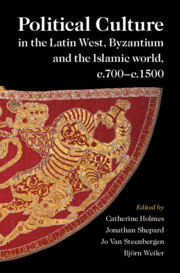 Political Culture in the Latin West, Byzantium and the Islamic World, c.700–c.1500
Political Culture in the Latin West, Byzantium and the Islamic World, c.700–c.1500 Introduction
Published online by Cambridge University Press: 11 August 2021
This introduction outlines the key aims of the book and its genesis, including a definition of what political culture means – the rituals and explicit legitimisation of power, status and property-holding, alongside the unstated assumptions and customs that help to channel tensions and rivalries within polities. It situates the volume’s approach – a presentation of three neighbouring and overlapping political spheres – within the recent turn towards the global middle ages. Neither a work of systematic and explicit comparison nor an attempt at overarching synthesis or grand narrative – nor a shot at tracing trans-regional connections – the book aims rather to find a conceptual language applicable to all three spheres, attempting to make each sphere accessible to non-specialists. This pioneering survey of three spheres – the Latin west, Byzantium and the Islamic world – should provide useful tools for learning, teaching and research today but is also an invitation to future study of medieval political culture.
To save this book to your Kindle, first ensure no-reply@cambridge.org is added to your Approved Personal Document E-mail List under your Personal Document Settings on the Manage Your Content and Devices page of your Amazon account. Then enter the ‘name’ part of your Kindle email address below. Find out more about saving to your Kindle.
Note you can select to save to either the @free.kindle.com or @kindle.com variations. ‘@free.kindle.com’ emails are free but can only be saved to your device when it is connected to wi-fi. ‘@kindle.com’ emails can be delivered even when you are not connected to wi-fi, but note that service fees apply.
Find out more about the Kindle Personal Document Service.
To save content items to your account, please confirm that you agree to abide by our usage policies. If this is the first time you use this feature, you will be asked to authorise Cambridge Core to connect with your account. Find out more about saving content to Dropbox.
To save content items to your account, please confirm that you agree to abide by our usage policies. If this is the first time you use this feature, you will be asked to authorise Cambridge Core to connect with your account. Find out more about saving content to Google Drive.